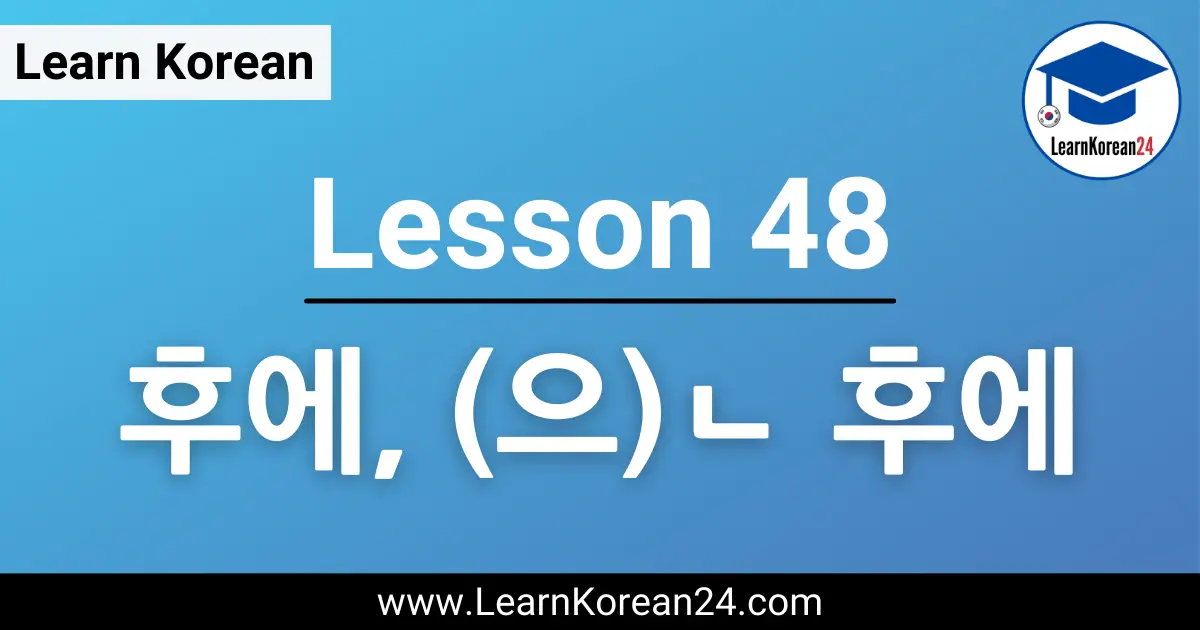Lesson 48: 후에, (으)ㄴ 후에
In this lesson, you will learn how to say ‘after’ using 후에 and (으)ㄴ 후에. By the end of this lesson, you’ll be able to say things like, “After I exercise, I always shower.“, “After class, I go home.“, etc.
Lesson 48: 후에, (으)ㄴ 후에
후에
When you want to say ‘after‘ with nouns, 후에 is used. There are no special conjugation rules with 후에. Just remember to leave a space between the noun and 후에. See the table below for an example.
| Conjugation Rule | Examples |
|---|---|
| Noun + 후에 | 수업 (lesson) → 수업 후에 30분 (30 minutes) → 30분 후에 |
Example Sentences With 후에
수업 = lesson
이 수업 후에 뭐 할 거예요? = What are you going to do after this lesson?
대학교 졸업 = college graduation
대학교 졸업 후에 취직했어요. = I got a job after college graduation.
30분 = 30 minutes
30분 후에 봐요! = See you in 30 minutes.
(으)ㄴ 후에
When you want to say ‘after‘ with verbs, (으)ㄴ 후에 is used. When attaching (으)ㄴ 후에 to verbs, you must choose either 은 후에 or ㄴ 후에. The one you use depends on whether the verb ends in a consonant or a vowel. See the table below.
| Conjugation Rule | Examples |
|---|---|
| Verb Stem Ends In Consonant + 은 후에 | 먹다 (to eat) → 먹은 후에 |
| Verb Stem Ends In Vowel + ㄴ 후에 | 만나다 (to meet) → 만난 후에 |
| <Irregular Conjugations> | 살다 (to live) → 산 후에 듣다 (to listen) → 들은 후에 돕다 (to help) → 도운 후에 짓다 (to build) → 지은 후에 |
Example Sentences With (으)ㄴ 후에
먹다 = to eat
밥을 먹은 후에 커피를 항상 마셔요. = After I eat a meal, I always drink coffee.
사다 = to buy
물건을 산 후에 영수증을 항상 받아요. = After I buy things, I always take a receipt.
이사하다 = to move in/out
이사한 후에 집들이를 했어요. = After I moved in, I had a housewarming party.
운동하다 = to exercise
운동한 후에 항상 샤워해요. = After I exercise, I always take a shower.
Things To Note
(으)ㄴ 후에 can be replaced with (으)ㄴ 다음에 (next) or (으)ㄴ 뒤에 (behind/after). For example,
운동한 후에 항상 샤워해요. = After I exercise, I always take a shower.
운동한 다음에 항상 샤워해요. = After I exercise, I always take a shower.
운동한 뒤에 항상 샤워해요. = After I exercise, I always take a shower.
If you want to emphasize the moment right after doing something, you can say ‘(으)ㄴ 직후에’, which means ‘directly after‘. For example,
오늘 너무 바빴어요. 그래서 점심을 먹은 직후에 다시 일을 시작했어요. = I was too busy today. So, right after I ate my lunch, I started working again.
Example Sentences
Here are some more example sentences using both 후에 and (으)ㄴ 후에:
오늘 마지막 수업 후에 학교 앞에서 만나요. = After your last lesson today, let’s meet in front of the school.
식사 후에 이 약을 드세요. = Please take this medicine after eating.
한 달 후에 아기가 태어나요. = My baby will be born in one month.
1년 후에 고향에 돌아가고 싶어요. = After a year, I want to go back to my hometown.
2주 후에 친구가 한국에 와요. = My friend is coming to Korea in two weeks.
세수한 후에 양치해요. = After I wash my face, I brush my teeth.
어제 영화를 본 후에 쇼핑했어요. = Yesterday, after I watched a movie, I went shopping.
돈을 모은 후에 여행을 갈 거예요. = After I save up some money, I will go on a trip.
이 책을 다 읽은 후에 좀 빌려 주세요. = After you finish reading this book, please lend it to me.

